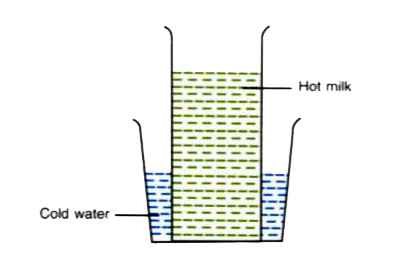Why does a thick glass tumbler crack when boiling hot water is poured into it? Explain.
Step-by-Step Solution:
1. Understanding Thermal Expansion:
- When materials are heated, they tend to expand. This is known as thermal expansion. Different materials expand at different rates when subjected to the same temperature change.
2. Analyzing the Glass Tumbler:
- A thick glass tumbler has an inner surface and an outer surface. When boiling hot water is poured into the tumbler, the inner surface of the glass comes into contact with the hot water.
3. Rapid Expansion of Inner Surface:
- The inner surface of the tumbler heats up quickly due to the hot water, causing it to expand rapidly. This is because the glass in contact with the boiling water absorbs heat quickly.
4. Slow Expansion of Outer Surface:
- In contrast, the outer surface of the tumbler does not heat up as quickly because it is exposed to the cooler air outside. As a result, the outer surface expands more slowly compared to the inner surface.
5. Uneven Expansion:
- This difference in expansion rates creates a situation where the inner surface is expanding much more than the outer surface. This phenomenon is known as uneven expansion.
6. Thermal Stress Development:
- The uneven expansion leads to the development of thermal stress within the glass. The inner surface wants to expand more, but the outer surface is restricting that expansion.
7. Cracking of the Tumbler:
- When the thermal stress exceeds the strength of the glass, it results in cracking. The glass tumbler cannot withstand the stress caused by the differential expansion, leading to its breakage.
Conclusion:
In summary, a thick glass tumbler cracks when boiling hot water is poured into it due to the rapid expansion of the inner surface compared to the slower expansion of the outer surface, leading to thermal stress that the glass cannot withstand.
---
- When materials are heated, they tend to expand. This is known as thermal expansion. Different materials expand at different rates when subjected to the same temperature change.
- A thick glass tumbler has an inner surface and an outer surface. When boiling hot water is poured into the tumbler, the inner surface of the glass comes into contact with the hot water.
- The inner surface of the tumbler heats up quickly due to the hot water, causing it to expand rapidly. This is because the glass in contact with the boiling water absorbs heat quickly.
- In contrast, the outer surface of the tumbler does not heat up as quickly because it is exposed to the cooler air outside. As a result, the outer surface expands more slowly compared to the inner surface.
- This difference in expansion rates creates a situation where the inner surface is expanding much more than the outer surface. This phenomenon is known as uneven expansion.
- The uneven expansion leads to the development of thermal stress within the glass. The inner surface wants to expand more, but the outer surface is restricting that expansion.
- When the thermal stress exceeds the strength of the glass, it results in cracking. The glass tumbler cannot withstand the stress caused by the differential expansion, leading to its breakage.
In summary, a thick glass tumbler cracks when boiling hot water is poured into it due to the rapid expansion of the inner surface compared to the slower expansion of the outer surface, leading to thermal stress that the glass cannot withstand.
Topper's Solved these Questions
- HEAT TRANSFER Book:ICSEChapter:HEAT TRANSFER Exercise:THEME ASSIGNMENT (OBJECTIVE TYPE QUESTIONS) (Fill in the blank)
Explore 3 Videos
- HEAT TRANSFER Book:ICSEChapter:HEAT TRANSFER Exercise:THEME ASSIGNMENT (true or false)
Explore 3 Videos
- HEAT TRANSFER Book:ICSEChapter:HEAT TRANSFER Exercise:EXERCISE (OBJECTIVE TYPE QUESTIONS) (Match the columN)
Explore 1 Video
- FORCE AND PRESSURE Book:ICSEChapter:FORCE AND PRESSURE Exercise:Picture Study
Explore 4 Videos
- LIGHT ENERGYBook:ICSEChapter:LIGHT ENERGYExercise:THEME ASSIGNMENT D. Statements given below are incorrect. Write the correct statements.
Explore 7 Videos
Similar Questions
Why does a thick glass tumbler crack when boiling hot milk is poured into it? Explain.
View SolutionA thick glass tumbler cracks when boiling hot water is poured into it because :
View SolutionA thick glass tumbler does not crack, when boiling hot tea is poured in it.
View SolutionWhy does a pyrex glass not crack when boiling hot tea is poured into it? Explain.
View SolutionWhy does a pyrex glass not crack when boiling hot tea is poured into it? Explain.
View SolutionAssertion : When hot water is poured in a beaker of thick glass, the beaker cracks.
Reason : Outer surface of the beaker expands suddenly.
View SolutionFill in the blank spaces by choosing the correct words from the list given below: List: contracts, heating, expand, linear, inflated
When ice is placed in a thick glass tumbler it cracks, because the inner surface of glass __________ more than the outer surface.
View SolutionUrea has a sharp melting point but glass does not. Explain.
View SolutionThe Fig. shows a glass tumbler containing hot milk which is placed in a tub of cold water. State the direction in which heat will flow.

View SolutionWhy does a glass vessel break when it falls on a hard floor, but it does not break when it falls on a carpet ?
View Solution
